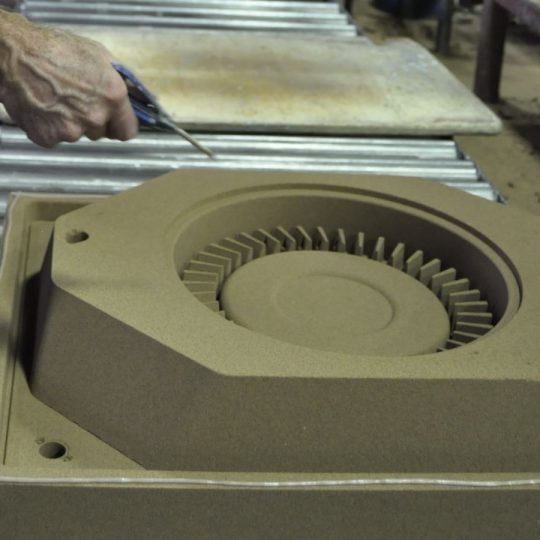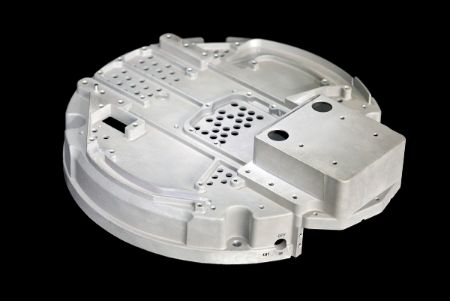Discover the Advantages of Aluminum Casting in Modern Production
Aluminum casting has become a crucial process in contemporary production. Its lightweight yet durable nature presents considerable advantages for numerous markets. The capability to accomplish intricate designs and preserve limited resistances contributes to its allure. aluminum casting. In addition, the cost-effectiveness and environmental advantages make it a sustainable option. As suppliers look for cutting-edge remedies, the role of aluminum casting remains to progress. What specific applications and advantages wait for exploration in this dynamic field?
Solid yet light-weight: The Benefits of Aluminum
Although lots of products are made use of in manufacturing, aluminum stands apart because of its amazing mix of light-weight residential or commercial properties and extraordinary strength. This special attribute makes aluminum an ideal choice for numerous applications, specifically in sectors such as automotive, aerospace, and building. Its low density enables less complicated handling and transportation, adding to reduced energy consumption throughout manufacturing and setting up procedures.
In addition, aluminum's strength-to-weight proportion is remarkable, making it possible for suppliers to create sturdy components without including unnecessary bulk. This characteristic is specifically useful in sectors where weight decrease can bring about improved fuel effectiveness and general performance. In addition, aluminum's resistance to corrosion improves the longevity of products, even more strengthening its charm in modern-day manufacturing.
Eventually, the light-weight yet solid nature of aluminum placements it as a recommended material, promoting technology and efficiency throughout numerous markets. Producers increasingly acknowledge that these benefits can lead to substantial improvements in design and performance.
Precision and Intricacy in Style
As suppliers welcome the capabilities of aluminum casting, they find brand-new methods for precision and intricacy in design. This production procedure enables the development of complex forms and thorough functions that standard approaches commonly have a hard time to attain. The fluidity of liquified aluminum allows it to fill complicated molds, leading to elements with tight tolerances and great surface area finishes.
This precision is specifically valuable in sectors such as aerospace and vehicle, where exact specifications are necessary for performance and security. Aluminum casting also fits cutting-edge styles that improve capability without endangering architectural honesty.

Cost-Effectiveness and Efficiency
Cost-effectiveness and efficiency are vital considerations for manufacturers discovering aluminum casting as a manufacturing approach. Aluminum casting offers substantial cost advantages because of its lower material costs contrasted to other steels (aluminum casting). The lightweight nature of aluminum decreases shipping and handling expenditures, and its superb thermal conductivity permits for quicker cooling times during the casting procedure, improving overall production rate
Aluminum's adaptability makes it possible for producers to develop complex forms and layouts, minimizing the demand for additional machining or assembly. This streamlining of manufacturing not just lowers labor expenses however also reduces lead times, allowing companies to react swiftly to market needs.
The toughness and rust resistance of aluminum spreadings contribute to longer product life-spans, decreasing recommended you read substitute prices over time. Therefore, manufacturers can accomplish a balance of high-quality output and decreased functional costs, making aluminum casting a significantly appealing alternative in contemporary manufacturing.
Ecological Sustainability of Aluminum Casting
Aluminum casting stands out as an environmentally lasting manufacturing alternative, specifically because of its recyclability and lowered environmental footprint. The procedure permits the effective usage of aluminum, a material that can be recycled forever without shedding its residential or commercial properties. This particular considerably lowers the need for virgin aluminum, consequently lessening and saving all-natural sources power consumption related to removal and processing.

Applications Throughout Industries: From Automotive to Aerospace
While varied industries remain to seek ingenious products for production, aluminum casting has actually shown to be a versatile solution across industries such as vehicle and aerospace. In the automobile market, aluminum spreadings add to light-weight car designs, improving fuel effectiveness and performance. Parts like engine blocks, transmission real estates, and wheels take advantage of aluminum's strength-to-weight proportion.
In aerospace, aluminum casting plays a considerable duty in producing intricate components that call for high longevity and reduced weight. Aircraft components such as braces, touchdown equipment, and architectural frameworks make use of aluminum for peak performance and security.
Additionally, the adaptability of aluminum casting permits it to deal with other industries, consisting of consumer electronic devices, aquatic, and industrial machinery. This versatility not just satisfies the details requirements of numerous applications yet also sustains ongoing innovation in producing processes. Because of this, aluminum casting remains a key player in modern-day production throughout countless Click Here markets.
Often Asked Questions
Just How Does Aluminum Casting Contrast to Other Metal Casting Processes?
Aluminum casting offers remarkable strength-to-weight proportions, faster cooling prices, and superb rust resistance compared to other metal casting processes. These advantages make it suitable for different applications, boosting effectiveness and performance in manufacturing.
What Are the Common Lead Times for Aluminum Casting Projects?
Normal lead times for aluminum casting jobs range from 2 to 8 weeks, depending on variables such as intricacy, order dimension, and manufacturing capacity. Efficient planning can assist lessen hold-ups and improve job timelines.
Can Aluminum Casting Be Utilized for Intricate Styles?
Aluminum casting can without a doubt accommodate intricate styles. Aluminum Casting Company. Its fluidity allows for in-depth patterns and shapes, find more info making it appropriate for complex elements in numerous industries. This adaptability improves design freedom while keeping architectural integrity and performance
What Post-Processing Options Are Available After Aluminum Casting?
Post-processing choices for aluminum casting consist of machining, brightening, surface treatments, anodizing, and welding. These techniques boost the coating, improve dimensional precision, and rise corrosion resistance, therefore optimizing the last product's performance and aesthetic allure.
How Do Temperature Level Modifications Affect Aluminum Casting Top Quality?
Temperature modifications greatly impact aluminum casting high quality by impacting fluidity, solidification rates, and potential problems. Fast cooling can result in enhanced brittleness, while extreme heat may trigger warping or incomplete filling of mold and mildews during casting.
Aluminum casting has emerged as a crucial procedure in contemporary production. As suppliers embrace the capacities of aluminum casting, they find brand-new methods for precision and intricacy in design. Aluminum casting processes commonly generate fewer greenhouse gas exhausts contrasted to other steel casting techniques. While varied industries continue to look for cutting-edge materials for production, aluminum casting has verified to be a functional remedy throughout sectors such as auto and aerospace. In the automobile market, aluminum castings add to light-weight car styles, enhancing gas efficiency and performance.